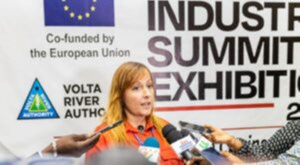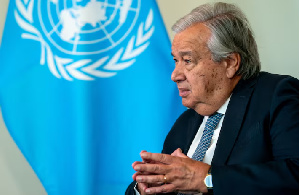- Home - News
- Polls
- Year In Review
- News Archive
- Crime & Punishment
- Politics
- Regional
- Editorial
- Health
- Ghanaians Abroad
- Tabloid
- Africa
- Religion
- Election 2020
- Coronavirus
- Photo Archives
- News Headlines
- Press Release
General News of Tuesday, 14 September 2021
Source: gbcghanaonline.com
Do not politicise Covid-19 vaccinations - TUC Secretary General
The TUC Secretary-General, Dr Yaw Baah, has encouraged Ghanaians, especially those in the informal sector, to respond positively to the Covid-19 vaccination to ensure a resilient economy after recovery from the devastating effect of the pandemic.
He said the country needs healthy citizens, given the negative impact of the pandemic on the domestic and global economy.
According to Dr Baah, the informal sector of the economy was really hit by the pandemic, and so any attempt to promote the health and safety of Ghanaians should be embraced by all. He, therefore, condemned attempts to politicise the Covid-19 vaccination, not only in Ghana but globally, saying the virus does not discriminate.
Dr Baah said this in Accra at a sensitisation forum for TUC members in the informal economy on the covid-19 vaccination and the recovery process. It formed part of the TUC-Ghana and Danish Trade Union Development Agency, DTDA, Covid-19 recovery project, targeting 500 informal workers each in the Greater Accra and Ashanti Regions.
“From the figures I have, just about 2% of Ghanaians have been vaccinated, and that is not good. In other countries where they have been fully vaccinated, they are almost getting back to their normal life as we see them on television. So these are members of the informal economy, and we know the myths going on about the vaccine, so the idea was to reach out to them to go for the vaccination. We think this is timely because a lot of Ghanaians have not been vaccinated, and so the more we get people to understand, the better.”
So we are reaching out first to our members; once they understand that they should go for the vaccination, they can convince one or two people to do the same. So, if we manage to meet 1thousand of our members and they all encourage their husbands and wives to go, we are talking about a higher number,” Dr Baah stated.
The TUC-Ghana scribe noted that “there are a lot of things about this vaccination and covid-19, some are myths and some are coming from politicians, so the point is that whether it is coming from a politician or a religious leader or priest or fetish priest, what we are saying is that vaccination is good for you. Do not allow anyone to deceive you. This disease doesn’t know whether you belong to any political party, it doesn’t know whether you’re black or white, in fact, it doesn’t matter the age, so I repeat, don’t allow anyone to deceive you because this vaccination is good for you.
It doesn’t have to be politics, but anything that prevents people from going for the vaccination is bad for us because the only way we can recover our economy from the devastating effects of Covid is to have the majority of Ghanaians vaccinated.”
Resource persons from the Ghana Health Service, Dr Domonic Nuertey and Dr Nana Kwame Fredua-Agyeman, took the participants through the myths and misinformation about the Covid-19 vaccination and urged them to pay attention to their health and safety issues.
Dr Nana Kwame Fredua-Agyeman commended the TUC for getting the vaccination message to the informal workers, who ply their trade in one of the critical segments of the economy.
“We know there are a lot of myths about vaccinations; some include what the vaccines can do to you adversely, which means there is a lot of misinformation about vaccines and the way to go. So as a body as Ghana Health Service, we like to do what in public health we call risk communication, to communicate the right information to defuse all the false myths about the vaccines to promote or encourage people to get vaccinated and be protected from Covid-19. Some of the things we do include using media outlets, both traditional and the internet, information vans and opinion leaders in society to encourage people to do well to get the vaccine to protect them from Covid19,” he stated.
“I think it’s a brilliant idea for the TUC to organise the sensitisation forum for informal workers. Because we have a country that is largely informal so it was a laudable idea to bring together traders and other people from the informal sector so we could communicate to them in their local dialects and also correct the misinformation that they have about the vaccination process in order to go out and get vaccinated. My message to the public is that the vaccines are safe; most of us have taken it. It’s protective, and in order for us to be protected from Covid, we encourage everyone to go for the vaccine so that we can have safe Ghana, a healthy Ghana and a wealthy one as well,” Dr Nana Kwame Fredua-Agyeman added.
The Head of International Affairs of TUC-Ghana, Mrs Mary Karimu, said the sensitisation forum was to motivate the players in the informal sector to be actively involved in the economic recovery process following the onslaught of the Covid-19 pandemic on the global health system and the economy. The TUC is, therefore, keen on educating the public to get vaccinated to facilitate the progress of work and enhance the livelihoods of workers in the informal sector.
“First of all, we realised their livelihoods have been affected, so we thought how do we ensure that they are healthy and then the next step how do we improve their businesses? So as part of the programme, one of the key things we are going to focus on is how we are going to improve their businesses, so there is a business management program for them as part of the sensitisation.
We’ve overlooked the health and safety aspect of the informal economy workers for so long, and the time is now. So we realised that the health and safety aspect is key for our informal economy workers. Their livelihoods are key, and that is why we are doing the Business Management Programme. So precisely we are going to teach or train about 200 informal economy workers in Accra and Kumasi on how to do sanitisers for domestic use, at least if they know how to do it they can even prepare and use it at their own market table so that when people come they can sanitise and take items. It’s a full thing we are running for them, and they will be given certificates for those who are able to complete the course.”











